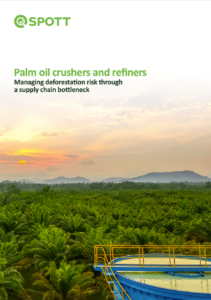A new report from ZSL (Zoological Society of London) examines deforestation risk through the palm oil supply chain bottleneck of companies with crushing and/or refining facilities. Palm oil crushers and refiners are key nodes in a complex supply chain, and their central role places them in a position of significant leverage, and responsibility, to drive sustainability in the sector.
Effective implementation of zero-deforestation commitments requires supply chain traceability to plantation, as well as processes in place to support and monitor supplier compliance. By failing to implement sourcing policies, crushers and refiners, as well as their buyers, investors and lenders, leave themselves open to financial, operational, reputational and regulatory risks.
ZSL’s SPOTT initiative assesses palm oil companies on their public disclosure regarding their organisation, policies and practices related to environmental, social and governance (ESG) issues. In 2019, ZSL assessed 77 companies with crushing and/or refining facilities.
This report provides an overview of the zero-deforestation commitments made by these companies, their level of traceability and supplier engagement, and highlights the risks and recommendations for improvement.
Only 47% of companies assessed commit their suppliers to zero deforestation. This leaves a significant landbank at risk of deforestation.
Only 23% of companies assessed both commit their suppliers to zero deforestation and have a time-bound commitment to achieve 100% traceability to plantation level. No companies report they can trace 100% of fresh fruit bunches (FFB) from their supplier mills back to plantation level. This lack of traceability allows leakage of unsustainable palm oil into the market.
Only 6% of companies assessed report how they support high-risk mills to become compliant with sourcing policies, or have a public time-bound plan to engage with all high- risk mills within three years. This leaves companies at risk of non-compliance within their supply chain.
Crushers and refiners should define and implement robust, time-bound zero-deforestation commitments which extend to all their suppliers. They should commit to achieve 100% traceability to plantation, and ensure that suppliers are engaged and monitored on progress.
Downstream buyers should incorporate sourcing policy requirements into contracts and clearly communicate their sourcing policies to their upstream suppliers. They should continuously engage with suppliers to monitor implementation and assist with capacity building.
Financial institutions should develop policies that require companies to commit to implementing strict zero-deforestation commitments across their whole value chains, or be Roundtable on Sustainable Palm Oil (RSPO)-certified, as well as incorporate traceability and supplier verification processes into their due diligence frameworks.

